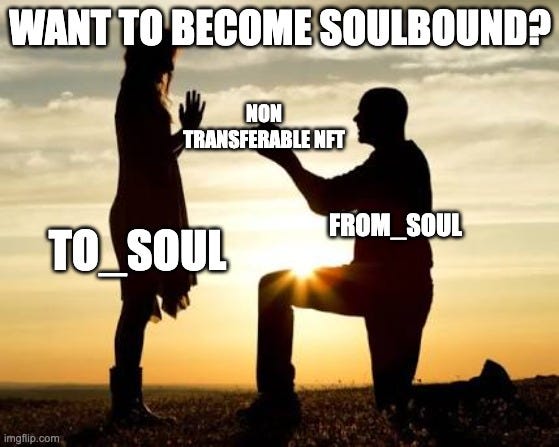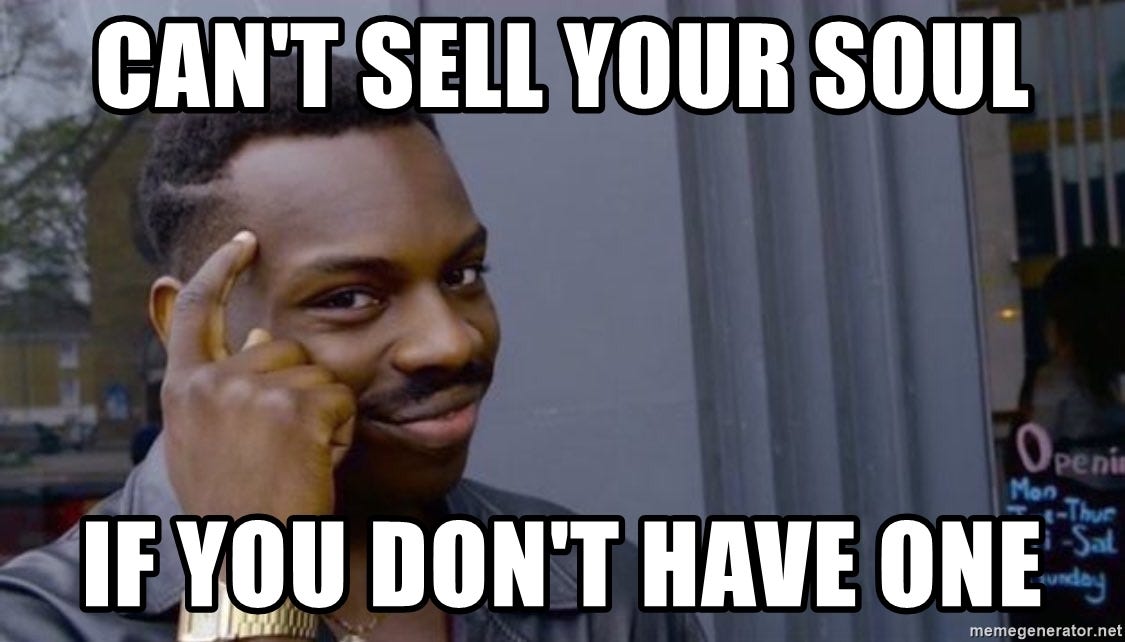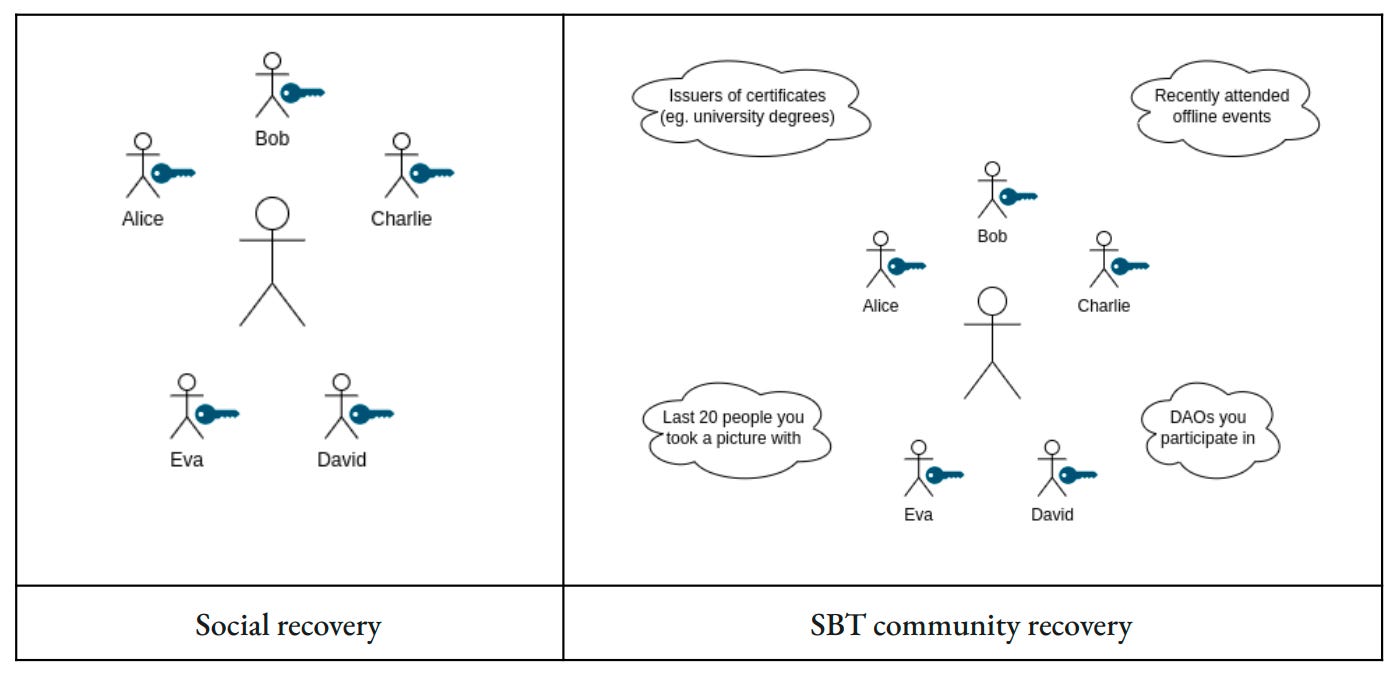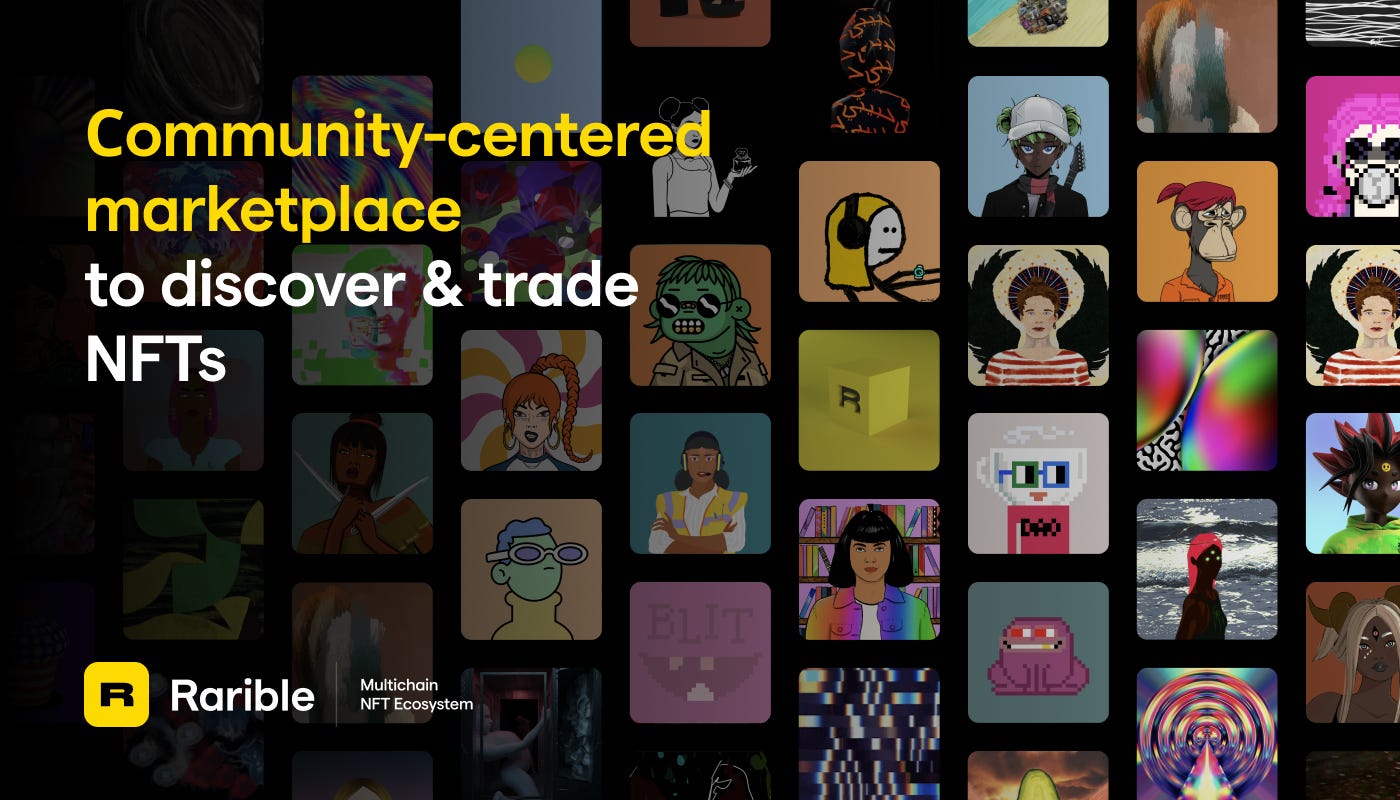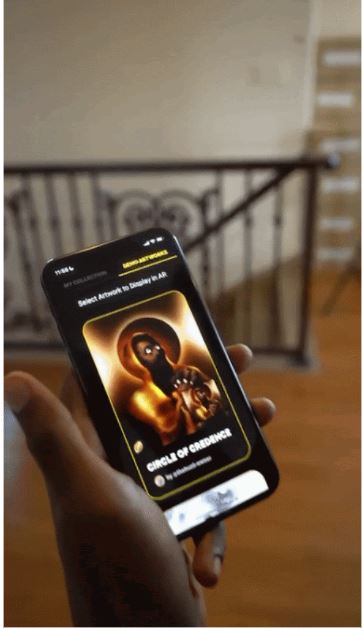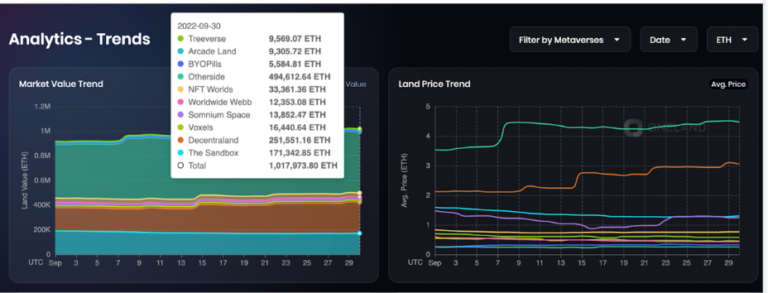Metaversal is a Bankless newsletter for weekly level-ups on NFTs, virtual worlds, & collectibles
Dear Bankless Nation,
It’s been a down week for cryptocurrency and NFT markets. The operative word there is markets, though. In contrast, the knowledge and research base of our ecosystem has seemingly just taken a very meaningful leap forward in kind.
That’s because this week Ethereum creator Vitalik Buterin joined forces with economist Glen Weyl and Flashbots researcher Puja Ohlhaver to publish “Decentralized Society: Finding Web3’s Soul.”
Notably, at the heart of the research are new humanistic possibilities around non-transferable “soulbound” NFTs, which Vitalik Buterin has been exploring this year.
After reading this new paper, I’m reminded of how I felt when I first discovered Ethereum, i.e. very hopeful for a better future and confident we have the minds and means to really start actualizing it.
Maybe you don’t have time to go through the +30 pages yourself, though, or maybe you’re a little confused on some of the concepts therein. No worries! Below I’ll paraphrase, summarize, and quote the authors’ big ideas so you’ll know the basics of DeSoc in no time.
-WMP
🙏 Sponsor: Rarible – discover & trade NFTs across multiple blockchains and communities✨
The main ideas
-
Right now, web3 mostly revolves around financialized and transferable assets.
-
However many mainstream economic acts (e.g. “uncollateralized lending and building personal brands”) rely on non-transferable social relationships that are built on trust and persist over time.
-
The authors propose non-transferable soulbound tokens (SBTs) held by “Souls,” i.e. accounts, as an avenue for better encoding networks of social relationships in web3.
-
SBTs would encode these relationships by tracking the “commitments, credentials, and affiliations” of Souls on-chain.
-
Decentralized Society, or DeSoc, would lean on SBTs to allow “Souls and communities come together bottom-up, as emergent properties of each other to co-create plural network goods and intelligences, at a range of scales.”
-
If pursued, DeSoc can additionally pave the way to new property rights and governance mechanisms that “reward trust and cooperation while protecting networks from capture, extraction, and domination.”
-
Altogether, DeSoc points away from the web3’s current hyper-financialized state toward a “more transformative, pluralist future of increasing returns across social distance.” (More on social distance here).
Souls and Soulbound tokens (SBTs)
-
A “Soul” is synonymous with account, wallet, etc.
-
Souls could hold SBTs, which would be non-transferable, potentially revocable, and initially public; later on private SBT use cases will become more feasible.
-
SBTs can track “affiliations, memberships, and credentials” like “educational credentials, employment history, or hashes of […] writings or works of art.”
-
SBTs can be self-issued by a Soul, but importantly they can also be attested to by other Souls “who are counterparties to these relationships.”
Possible DeSoc use cases
Artists
Artists can use their Soul to publish NFTs. In doing so, they can “stake their reputations on their works” in a direct, on-chain manner. Artists can also create their own SBTs toward different ends, like linking their NFTs to a collection on-chain to deepen provenance. Accordingly, SBTs and the social networks they chart out can help defend against plagiarism, deep fakes, and more going forward.
Uncollateralized lending
Facilitating loans without upfront collateral is still a bit of a clunky problem in web3’s DeFi sector. As such, SBTs could be used to create a “censorship-resistant, bottom-up alternative to top-down commercial and ‘social’ credit systems.”
The grand idea here? SBTs can be avenues for letting people stake their reputations as collateral for a loan instead of having to collateralize money upfront.
“Loans and credit lines could be represented as non-transferable but revocable SBTs, so they are nested amongst a Soul’s other SBTs,” the paper’s authors wrote. “[That’s] until they are repaid and subsequently burned, or better yet, replaced with proof of repayment.”
Community recovery
In web3, you don’t want to lose access to your wallet because in the context of DeSoc then you’d lose access to your Soul.
Social recovery wallets like Argent, which let you lean on trusted relationships (i.e. guardians), are the best bet we currently have to preserve our Ethereum accounts for the long term. Yet over time it can be tedious to maintain a close-knit group of active guardians, so a better alternative may come through “community recovery” via SBTs.
Why so? Because SBTs track what communities you’re a part of, so if you ever need to recover your Soul then SBTs can be used for “drawing on a maximally broad set of real-time relationships for security” instead of just a handful of guardians. Some implementation mechanics still need to be worked out here, but the concept is certainly possible.
Souldrops
Hitherto, airdrops have been a rather imprecise or inefficient means of cultivating new web3 communities. In contrast, SBTs can allow “communities to be convened at unique intersections of Souls.”
“Souldrops are airdrops based on computations over SBTs and other tokens within a Soul,” the authors noted. “For example, a DAO that wants to convene a community within a particular layer 1 protocol could souldrop to developers who hold 3 out of the last 5 conference attendance SBTs, or other tokens reflecting attendance like POAPs.”
DAO defense
DAOs, which center around community governance, face the threat of sybil attacks, i.e. users having multiple wallets in order to multiply their voting power. SBTs would offer a way to defend against these sorts of attacks because they’d make it easier to separate “unique Souls and probable bots” in order to deny “any voting power to a Soul that appears to be a Sybil.”
Flexible property
Today in most cases an NFT confers its owner the right to use, destroy, or profit from the asset all at once. But outside of NFTs it’s unusual to find all these property rights afforded to a single owner. Consider how you can use an apartment per a lease but you can’t destroy it, etc. With SBTs, then, not only can you mimic mainstream property approaches but you can also create novel approaches for web3, too. For example, the authors mentioned the possibility of a local currency experiment in which SBTs could make a currency “more valuable to hold and spend by Souls who live in a particular region or are part of a particular community.”
Why DeSoc matters
“Web3 aspires to transform societies broadly, rather than merely financial systems. Yet today’s social fabric—families, churches, teams, companies, civil society, celebrity, democracy—is meaningless in virtual worlds (often called the ‘metaverse’) without primitives representing human souls and the broader relationships they support. If web3 eschews persistent identities, their patterns of trust and cooperation, and their composable rights and permissions, we see, respectively, sybil attacks, collusion, and a limited economic realm of wholly transferable private property—all of which trends towards hyper-financialization.
To skirt hyper-financialization—yet unlock exponential growth—we propose augmenting and bridging our sociality across virtual and physical realities, empowering souls and communities to encode rich social and economic relationships. But simply building on trust and cooperation is not enough. Correcting for biases and tendencies to over-coordinate (or collude) among trust networks is essential to encouraging more intricate, diverse relationships that span greater social distances than before. We call this ‘Decentralized Society (DeSoc)’: a co-determined sociality, where Souls and Communities convene bottom-up, as emergent properties of each other to produce plural network goods across different scales.
We emphasize plural network goods as a feature of DeSoc, because networks are the most powerful engine of economic growth, yet the most susceptible to dystopian capture by private actors (e.g., web2) and powerful governments (e.g., Chinese Communist Party). Most significant economic growth results from increasing network returns, where every additional unit of input yields incrementally more output. […] Networks with increasing returns are most efficient when treated neither as purely public nor purely private goods, but rather as partial and plural shared goods. DeSoc provides the social substrate to unbundle and reconfigure rights […] and enable efficient governance mechanisms across these rights that augment trust and cooperation while checking for collusion and capture.”
(My) Conclusion
For now, DeSoc remains a concept and a field of study rather than something we can dig into in the wild today.
Yet via Ethereum and NFTs, we already have the basic infrastructure required, and these technologies will continue to advance too. And through this “Decentralized Society” paper, we already have the basic blueprints, not to mention many projects are starting to explore soulbound NFTs.
I think critics and proponents alike can often get too caught up in what web3 is today. And while that is totally fair and it’s definitely worth hashing out and working on, I and many others here are dreamers that can’t help but obsess over and envision what’s to come. And there’s still a ways to go before DeSoc really arrives, but now after this paper it feels clearer than ever that the future of NFTs will be more expansive and more social than many of us could have ever imagined before.
Action steps
Author Bio
William M. Peaster is a professional writer and creator of Metaversal—a Bankless newsletter focused on the emergence of NFTs in the cryptoeconomy. He’s also recently been contributing content to Bankless, JPG, and beyond!
Subscribe to Bankless. $22 per mo. Includes archive access, Inner Circle & Badge.
🙏Thanks to our sponsor
Rarible.com is a top multichain NFT marketplace underpinned by Rarible Protocol, the open source, community-governed NFT API that simplifies building community marketplaces and any other NFT projects and integrations.
💸 Connect up to 20 Ethereum, Polygon, Tezos, Flow wallets to your profile
🙋♀️ Place a floor bid on BAYC, BossBeauties, mfers, and other NFT collections
📲 Monitor and manage your NFT portfolio in Rarible mobile app (iOS, Android)
🔗 Start building on Rarible Protocol: no API key, no rate limit, your own node option
Not financial or tax advice. This newsletter is strictly educational and is not investment advice or a solicitation to buy or sell any assets or to make any financial decisions. This newsletter is not tax advice. Talk to your accountant. Do your own research.
Disclosure. From time-to-time I may add links in this newsletter to products I use. I may receive commission if you make a purchase through one of these links. Additionally, the Bankless writers hold crypto assets. See our investment disclosures here.


